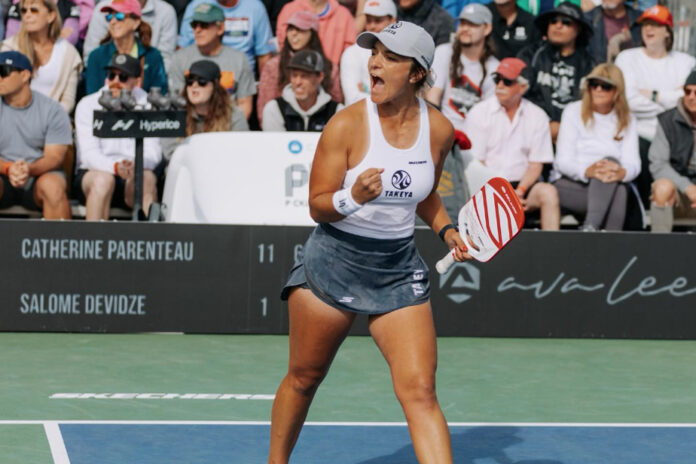Catherine Parenteau first dreamed of a career in the world of tennis. She managed to become a professional athlete, but by arming herself with patience and above all with a different kind of racket. In just a few years, the athlete from Repentigny has risen through the ranks to reach the top of his sport, to become the face of his discipline, pickleball.
According to the saying, no one is a prophet in his country. Like Félix Leclerc or Georges St-Pierre, Parenteau enjoyed overseas glory before being recognized on his native land. The second-ranked player in the world moved south of the border at the age of 16 to try to become a professional tennis player.
After a season at the University of Arkansas, she moved up north to join the ranks at Michigan State University. However, she had to give up on her dream. First, because of a serious shoulder injury. Then, because it would have been impossible for her to make a living from tennis. A finding that is difficult to accept. Until the day a former trainer suggests pickleball to her. It was in October 2015.
“At first, I didn’t feel like it, because I thought the name was weird,” she says, on the road between Miami and Orlando, where she was heading for training. She resisted for two weeks before finally learning this new discipline. It was love at first sight.
“I really liked it. I fell in love with the sport. I joined a club in Michigan and started playing three, four times a week. A semester later, she signed up for the U.S. Open, her first ever tournament.
Seven years after that whim, she is a three-time American Championship champion, she has 16 titles on the Professional Pickleball Association (PPA) circuit, she is second in the singles standings and sixth in doubles, she has the support of sponsors big names like Skechers and has nearly 20,000 followers on Instagram.
In Quebec, his name still resonates very little, for the moment. In the United States, however, it has crowds running.
Pickleball is the fastest growing sport in the United States. The enrollment rate has increased by 158.3% over the past three years.
The interest shown by well-known figures in this less and less neglected sport has undoubtedly been beneficial for its popularity. In recent years, LeBron James, Tom Brady, Roger Federer, Kevin Durant, Patrick Mahomes, Drew Brees, Kim Clijsters, Andy Roddick, John McEnroe and Andre Agassi have all contributed in their own way to the development of the discipline. Either by playing it or by investing considerable sums of money in it.
“It’s great, because it attracts attention to our sport,” said the Quebecer.
The fact remains that beyond its visibility, the best way to sell this sport is to see athletes like Catherine Parenteau at work. The exchanges are intense, fast, even dramatic, and the physical capacities necessary to hold in exchanges of this caliber are exceptional.
The 28-year-old Quebecer stands out for her spirit, her fighting spirit and her resilience on a pickleball court. His way of playing and promoting his sport in the United States has earned him a place of choice in the highest echelons of pickleball. From now on, she is a model. “I never expected this. It happened in a few years and I am very grateful. »
The next step will be for her to reach the world number one, held by the American and young prodigy of 16 years Anna Leigh Waters. “I started beating her this year in singles and I can compete with her. I’m working even harder this year,” says Parenteau.
If Parenteau can now live solely from pickleball thanks to its scholarships and sponsorships, it was almost a utopia just a few years ago. Her biggest wish has always been to become a professional athlete, but initially “it was just a hobby,” she says.
This hobby has become a passion. “I was at a private club in Naples and I was coaching pickleball players six to eight hours a day. Then, this passion turned into a profession.
For those around her, this decision was complicated to conceive, she recalls. “A lot of people around me thought it was weird that I got involved in pickleball like that. It was really hard to explain that to my parents three years ago. »
Looking back, Parenteau is convinced she made the right choice. Her titles and the recognition within her community are two strong arguments allowing her to realize how lucky she is to be able to live from her passion. And she is aware of it.
“I’m really lucky. I consider myself not working. I don’t feel like I have a job. It’s my passion and I make my living from it. »
The next step is to obtain greater recognition from Quebecers. The day she returns to her native land, maybe pickleball will take a more important place on the provincial sports scene. While waiting for the promised land, she continues to hold the fleur-de-lis flag high wherever she goes, because where she stops, she shines.















